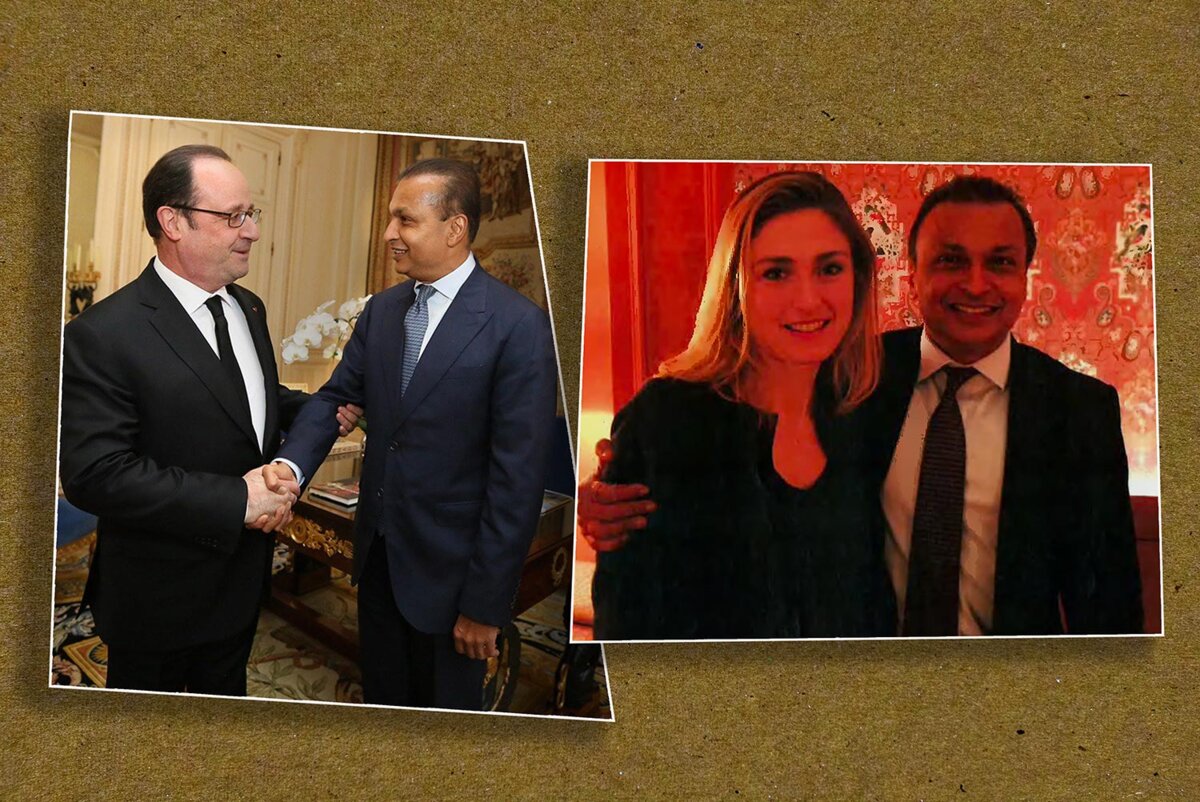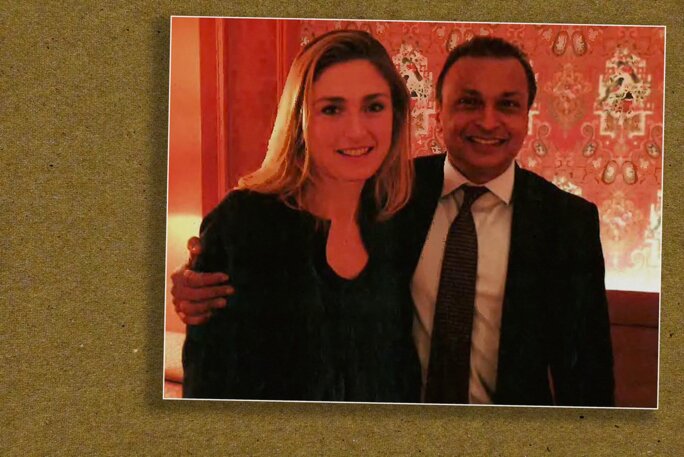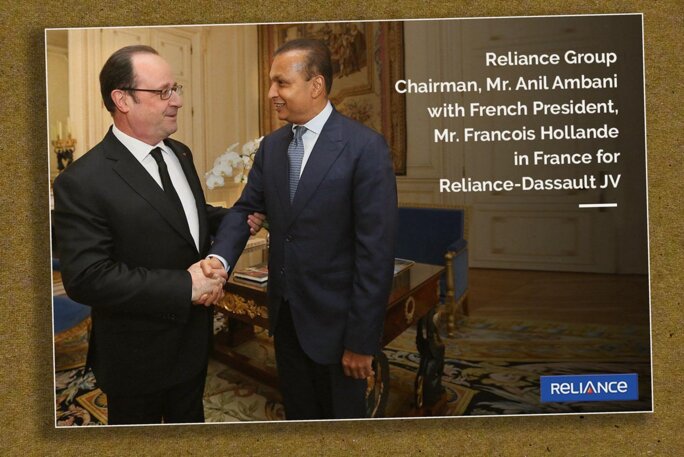“Everything has already been said about this, several years ago. I've nothing to add. Kind regards.”
It was with this brief, final text message on June 29th that François Hollande shut down Mediapart’s questions about the sale of 36 Dassault Aviation Rafale fighter jets by France to India in 2016. Yet in light of the ongoing French criminal investigation, details of which have been seen by Mediapart, the former president’s role now raises question marks.
The head of state from 2012 to 2017 is of course himself protected by presidential immunity; article 67, paragraph 2 of the French Constitution states that a president is not responsible for acts carried out in that role, unless charged before the International Criminal Court or France's special Haute Cour ('High Court') by which a French president can be impeached. However, nothing prevents a president from being summoned as a witness, in the same way Nicolas Sarkozy was, under threat of arrest, during the Élysée polling fraud trial on November 2nd 2021.
Moreover, even if François Hollande feels he has already “said everything”, this was before the criminal investigation into the Rafale fighter jet sale that was launched in 2021, following a legal complaint filed by the anti-corruption non-governmental organisation Sherpa. Since then, evidence gathered by detectives from France's anti-corruption police unit, the Office Central de Lutte contre la Corruption et les Infractions Financières et Fiscales (OCLCIFF), between 2023 and 2024 has weakened the position of the former Socialist president, who became an MP again in 2024.
As newspaper Libération has revealed, his wife, actor and producer Julie Gayet was questioned “voluntarily” by OCLCIFF detectives as a “person of interest” in what might be termed the “cinema” side of the case, on October 16th and 31st 2024.
Julie Gayet is suspected of passive influence peddling, passive corruption, and the laundering of the proceeds of those offences, for having received, as co-producer of the film Tout là-haut, funding of 1.65 million euros from the head and owner of Reliance group, Anil Ambani. At the same time, the same man, in his capacity as Dassault’s industrial partner in India, was concluding an intergovernmental contract between France and India for the Rafale sale. The producer benefits from a presumption of innocence.

Enlargement : Illustration 1

Asked by Mediapart in September 2018 about this strange coincidence, François Hollande insisted he was “not at all aware” of his partner’s company working with Anil Ambani’s group, a group which he only knew of in connection with the Rafale deal. “It was the Indian government who had proposed this service group [Reliance], and Dassault who negotiated with Ambani,” Hollande told Mediapart at the time. “We didn’t have a choice, we took the interlocutor who was given to us. That’s why, moreover, this group had no reason to do me any sort of favour. I couldn't even have imagined that there was any link with a Julie Gayet film.”
Business tycoon networking
The timeline of events, however, does not favour the couple's position. For nearly a year, the Indian businessman and film sponsor maintained an ambiguous relationship with the producer on one side, and her partner - the president of France - on the other, without a single red or even amber flag being raised.
The producer met Anil Ambani at the Bristol Hotel in Paris on April 26th 2016, shortly before she organised a dinner with him as a guest at the Élysée Palace on June 12th 2016, in a “private” setting. This was attended by François Hollande. She claimed, against all the evidence, that at that private dinner at the presidential residence the president, her future husband, had not recognised the businessman, and had no idea who he was. Then François Hollande met Anil Ambani again at the Élysée in February 2017, this time in a public setting and fully aware of who he was.
According to information gathered by the investigation, the suspicions surrounding Julie Gayet therefore appear to leave François Hollande's position more exposed.
I wasn't in any way aware of the Rafale sale, nor of France’s foreign policy.
At least two public announcements could not have escaped the notice of the president and his staff at the time. One was a Reliance press release, dated January 24th 2016, which announced a “partnership” with Julie Gayet’s company, on the same day the French president landed in New Delhi for a three-day state visit. The other was an article on the site Intelligence Online in November 2016, devoted to the subject of “Rafale's partner in Delhi“, which stated that “Julie Gayet’s next films will be financed by Reliance”.
“The Indian magnate Anil Ambani, who is close to prime minister Narendra Modi, is carefully networking in Paris circles in order to become indispensable in the booming bilateral business relationship,” the site noted.
On October 16th 2024, the detective in charge of the case asked Julie Gayet: “Was it not impolitic in 2016 to accept funding for the film from Reliance, at a time when Anil Ambani was set to be alongside Narendra Modi in the negotiations over France’s sale of Rafales to India?”
“I didn’t really make the link,” replied the producer. “I wasn't in any way aware of the Rafale sale, any more than I was of France’s foreign policy. I didn’t know about Anil Ambani’s ties with Modi, and even less about Indian politics.”
The word “Reliance” appears in Julie Gayet’s diary as early as November 2015, two years before the film’s release. The producer admits that “from the beginning”, Anil Ambani knew she was the president’s partner. “I can tell you that shortly after I first contacted Reliance about the film, Amitabh [editor's note, Jhunjhunwala, the group’s number two] knew who Julie Gayet was,” confirmed Ravi Viswanathan, a French banker based in Singapore who acted as a middleman to bring in Indian funding through his investment firm Visvires Capital.

Enlargement : Illustration 2

While in Paris, Anil Ambani invited Julie Gayet and the film’s executive producer Élise Soussan for drinks at the Bristol on April 26th 2016. “No French political topic was raised during the conversation,” Élise Soussan recalled. “[Anil Ambani] did not mention François Hollande’s name but I remember he made a joke, in English, since the whole conversation was in English, implying that he knew about Julie Gayet’s relationship with the president.” The businessman was “trying to make an impression on the president’s partner”, she added. “He only spoke to Julie.”
“He paid no attention to me,” she continued. “He wanted a photo, but it was a photo of him and Julie that he wanted. I’m the one who took it, with my phone.”
Julie Gayet then promised Anil Ambani that she would invite him to dinner soon.
'Dinner with Anil'
On June 12th 2016, the Indian businessman joined the producer and the French president for dinner at the Élysée Palace. “Why did you invite Mr Ambani into the intimacy of your home?” the investigator asked.
“It was a dinner held in the private apartments of the Élysée with Anil Ambani and his son, as well as close friends who spoke English,” explained Julie Gayet, who also confirmed that François Hollande was present. “I invited Anil Ambani, because I often do that with film partners. Obviously, this time it was at the Élysée, but privately, since I was living there.” The producer said she had wanted to host a “warm and friendly” dinner.
She also gave Ambani’s son tickets to a match at the Euro 2016 tournament, which was being staged in France.
“Why didn’t President François Hollande question Mr Ambani’s presence [at the dinner], given that he had presumably already accompanied prime minister Modi during an official visit to France in 2015?”
“I genuinely think he didn’t recognise him or make the link, as it was to do with me and my film,” replied the producer.
In further questioning, fifteen days later, Julie Gayet said that the subject of the film’s funding was not brought up during the meal.
“How do you explain that a sitting president, who was known to be close to Michel Sapin [editor's note, Hollande's minister of finance] and who during his term of office would enact the Sapin II law [editor's note, a law concerning transparency, anti-corruption, and economic reform], would agree to dine in his private apartment with someone who hadn’t been vetted by the Élysée, an individual who, according to you, he didn’t recognise?”
“I can’t speak for him. Private dinners were notified to the president’s secretariat so that it was in his diary. They didn’t go through protocol or advisers. I should say that I sometimes hosted dinners in the private quarters without naming my guests, either to protocol or anyone else at the Élysée,” Julie Gayet added.

Enlargement : Illustration 3

When investigators examined Julie Gayet’s mobile, they saw that on her diary she had written “dinner with Anil” for June 16th 2016. They also found she had the numbers for the businessman, his son, Reliance’s number two, and the banker middleman. In particular, they found that the relationship had continued, with friendly text exchanges between 2020 and 2023.
In April 2020, when he sent his condolences to François Hollande following his father’s death, Anil Ambani wrote to Julie Gayet that he had great respect for him and was “always grateful for his warmth and kindness”. “I’d love to speak to François as soon as possible,” the businessman added. He also sent a parcel to Julie Gayet after his son’s wedding. The producer wished his son “all the best”. “Lots of 'Bonheur',” she wrote.
Julie Gayet nonetheless claimed she had “no real relationship” with the businessman. “He wished me a Happy New Year for a few years, on account of our good relations after that meeting,” she commented. The Reliance money landed in the film’s production accounts in March 2018, three months after the film’s release.
Panic mode
In her defence, Julie Gayet distanced herself from the film, its production, and even its direction. According to director Serge Hazanavicius, Tout là-haut was a project driven from the outset by the producer. Two Luxembourg financiers, Frédéric and Michael Reichling, had contacted Julie Gayet as early as 2011 to “develop a project with [French actor] Kev Adams”.
“We started with Julie on a film for Kev, written and directed by me,” the director, who had given the actor his debut in 2009, said when interviewed as a witness. “We began development with Julie’s company, then called Amarante. She funded the script, but I was also a co-producer with a 30% stake, because I brought the script, my mountain expertise [editor's note, the film is about a young snowboarder], and Kev Adams as lead actor.”
Kev Adams, the young actor with whom the project had been developed from the start, brought in his company, My Family, run by Élise Soussan. Serge Hazanavicius directed the film, but eventually quit the co-production without even hearing about Reliance's or Anil Ambani’s involvement, and nor did Kev Adams know about it. Though Reliance is listed in the credits, it was investment firm Visvires Capital that, in a curious arrangement, acted as go-between for Reliance and wired the funds to the film's production department.
In September 2018 Julie Gayet told Mediapart that My Family had “asked Reliance, via one of its partners, Visvires, to join the film’s finance consortium”. “So it was solely at the initiative of My Family that Reliance invested in the film to the tune of 10% of the budget [editor's note, actually 16%], under the same terms as other investors,” she insisted.
According to the investigation, Julie Gayet, who also knew several partners at Visvires, tried at the time to secure a statement clearing her. She sent numerous messages.
“My lawyer has asked whether you’d agree to say that the link to Reliance came from you… Well, from Kev,” she wrote to producer Élise Soussan from My Family.
“I’m happy to,” replied Élise Soussan.
“Julie messaged me quickly to say something had come out and it was nonsense, and I absolutely had to say it was me who introduced Visvires to the co-producers,” Élise Soussan said when interviewed as a witness for the investigation. “She wanted me to say she had nothing to do with the people from the company Visvires and that I’d brought in the funding. She wanted me to say that Rouge International [editor's note, Julie Gayet’s company] had no link to Visvires or Reliance. To which I replied: 'No problem, I’ll tell the truth, that it was via My Family that Visvires and then Reliance got involved in the film’s funding.'”
Fifteen days later, Julie Gayet asked Élise Soussan for another press statement. “I replied that we’d already issued one, and I didn’t see the point in doing another,” Élise Soussan added. Julie Gayet was calling “insistently” and was “showing real panic”.
“It’s just for a quick statement to stop the madness of certain people,” Julie Gayet wrote again. “Something simple to say stop, there’s nothing shady, no conflict of interest in this funding. The contracts are at the CNC [editor's note, the Centre national du cinéma]. You’ve been in touch with Visvires since 2014, it’s a regular fund for commercial films… Blah-blah-blah. Can I send you a draft?”
Élise Soussan ran the draft by her lawyer, who blocked it.
“My dear Julie,” she replied by text, “my lawyer has read the draft statement. She says this statement is far too detailed, which is unnecessary and could backfire on you. The wording used is also tendentious (‘shady’…), and not necessarily accurate - Visvires didn’t invest in the film because we were shooting in India; it’s the other way round, we shot in India because we had an Indian partner. […] My dear Julie, I promise to help however I can.”
Élise Soussan insisted that she “personally had no interest in making a statement”.
“In your view, did Ms Gayet use her relations with President Hollande to assure Mr Ambani of the involvement of his group in the intergovernmental agreement [editor's note, the Rafale contract] in return for the funding of the film Tout là-haut to the tune of 1.65 million euros?” the detective asked.
“I have absolutely no idea,” Élise Soussan replied.
----------------------------------------------------------------------------
- The original French version of this article can be found here.
English version by Michael Streeter


